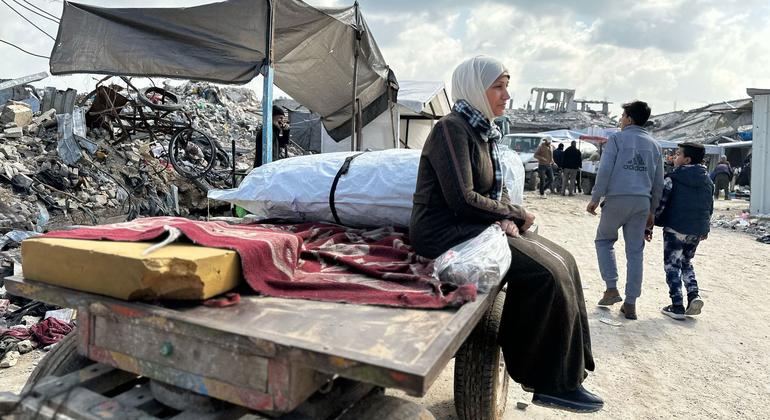The situation in Gaza continues to deteriorate, with reports from humanitarians in the Strip indicating increasing challenges in accessing essential items such as food, water, and medical services. Briefing reporters in New York, UN Spokesperson Stephane Dujarric highlighted the slow progress in restoring the overall healthcare system in the devastated region. In the northern areas, only 16 percent of health service points are operational, including a limited number of hospitals, medical points, and primary healthcare centers. This lack of functioning health facilities is exacerbating the already dire situation for civilians in Gaza.
The overflowing trash heaps in the region are contributing to unsanitary living conditions, posing significant public health risks. A lack of spare parts has resulted in 80 percent of waste collection vehicles and containers being damaged or destroyed, further exacerbating the waste management crisis. Additionally, there is a lack of proper management of infectious medical waste, and solid waste is being mixed with debris contaminated with explosive hazards, posing dangers to the civilian population.
The threat of unexploded ordnance in Gaza has led to at least three deaths and nearly 40 injuries from 18 explosions recorded so far this year. The presence of unexploded ordnance continues to pose a significant risk to the safety and security of civilians, hindering recovery efforts in the region.
On a more positive note, efforts to provide education to children in Gaza are making progress. Since the start of the ceasefire, partners have established over 200 temporary learning spaces, supporting more than 170,000 children. Approximately 60 percent of school-age children in Gaza now have access to some form of learning, either in schools or temporary spaces. Education plays a crucial role in the recovery and rebuilding process in conflict-affected areas, providing children with stability and hope for the future.
In a related development, women’s rights organizations in Ukraine are facing a crisis due to major funding suspensions from the United States. A survey conducted by UN Women and partners revealed that nearly half of the 99 organizations surveyed had received or expected US funding before the suspension was announced in January 2025. The funding cuts have resulted in severe disruptions, jeopardizing emergency response, humanitarian aid, and development programs.
As a result of the funding suspensions, five organizations are set to close in the coming month, while 35 more may shut down within six months if new funding is not secured. The decline in international funding for gender equality initiatives in Ukraine since 2022 has been exacerbated by the recent cuts, leading to staff reductions, unpaid rent, utilities, and salaries for many organizations. Gender-based violence prevention programs, already underfunded in humanitarian response, have been particularly affected by the funding cuts.
UN Women Representative in Ukraine, Sabine Freizer Gunes, expressed concern over the impact of the funding cuts on critical projects, such as support for survivors of sexual violence, infrastructure restoration, and rebuilding schools and hospitals. Nine out of 10 organizations have been forced to shut down at least one gender equality or diversity program due to the lack of funding, further limiting support for vulnerable populations in Ukraine.
The funding cuts have created a sense of urgency among women’s rights organizations in Ukraine, as they struggle to maintain essential services and programs in the face of mounting financial challenges. The loss of funding threatens to undermine the progress made in advancing gender equality and supporting women and girls in Ukraine, highlighting the need for sustained support from the international community to address the urgent needs of vulnerable populations in conflict-affected regions.









